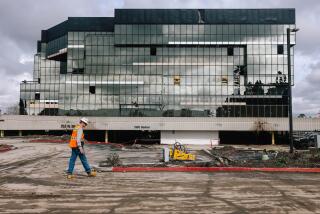Rental Outlay Cuts Into Budget for U.S. Drug Enforcers : $4 Million Being Spent on Empty Offices
- Share via
WASHINGTON — The Drug Enforcement Administration, despite mounting budget pressures, is paying $324,000 a month in rent for a 12-story headquarters building and seven floors of a twin structure that it will not occupy for at least three more months, The Times learned Thursday.
By the time the DEA starts moving into the facility in April, it will have paid $4.2 million in rent for the space, which was secured a year ago to permit the agency to consolidate its operations.
DEA officials acknowledge that the additional cost is contributing to cutbacks in its operations budget for such things as agent travel and equipment purchases but insist that it is having no impact on investigations.
The budget pressure on drug enforcers has become so intense that President Bush said in a published interview Thursday that the all-out war on drugs he promised in his inaugural address would be mainly an educational rather than a law enforcement effort. He said in the interview that the “overriding problem of the deficit” would make it difficult to increase spending on enforcement to keep drugs out of the country.
Top DEA officials contend that paying rent for a year on an unoccupied building is “not phenomenal” and “not exclusive to the DEA” and that renting the structures early was necessary to pin down the space.
While agreeing that the office-space “market was a lot tighter” when the lease was negotiated and signed last year, an official of the General Services Administration, the agency that manages real estate for the federal government, said it is far from ordinary for a building to remain vacant that long.
“Where we pay for unoccupied vacant space is the rare, rare exception,” said Paul Chistolini, assistant regional administrator for real estate and development in GSA’s national capital region.
Officials said the GSA has wanted to accelerate “the building-out,” or final touches on the structures so the drug agency could speed up its move to cut the time the buildings stand vacant.
But Donald P. Quinn, DEA’s assistant administrator for operations support, said that even if the agency had done so, it still would have had to pay rent through November on its downtown Washington headquarters. That could have been avoided only if the GSA had found another government tenant for the space.
The situation is “something over which DEA has no control,” Quinn said, citing “one horror story” where a government-leased building stood vacant for three years.
Chistolini said there was a 1984 incident in which a government-leased building in Hyattsville, Md., remained empty for up to three years because a tenant moved out and GSA was unable to find a replacement.
DEA officials do not dispute that the multimillion-dollar expenditure is pinching the agency’s operations.
“It’s something you have to absorb within the budget,” Quinn said, citing cutbacks in headquarters expenses and travel, the deferral of equipment purchases and tighter procedures for using rental cars.
Also, some West Coast DEA agents, insisting on anonymity, said that cutbacks instituted last October have limited money for informants, training of local police and purchases of evidence-related material.
However, Quinn and Thomas C. Kelly, DEA’s deputy administrator, maintained that the office space outlay--equal to less than 1% of DEA’s fiscal 1989 appropriation of $534.5 million--has had no impact on investigations that the agency conducts.
More to Read
Sign up for Essential California
The most important California stories and recommendations in your inbox every morning.
You may occasionally receive promotional content from the Los Angeles Times.












